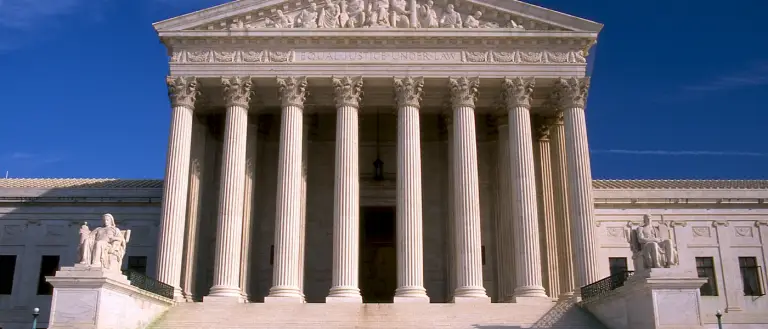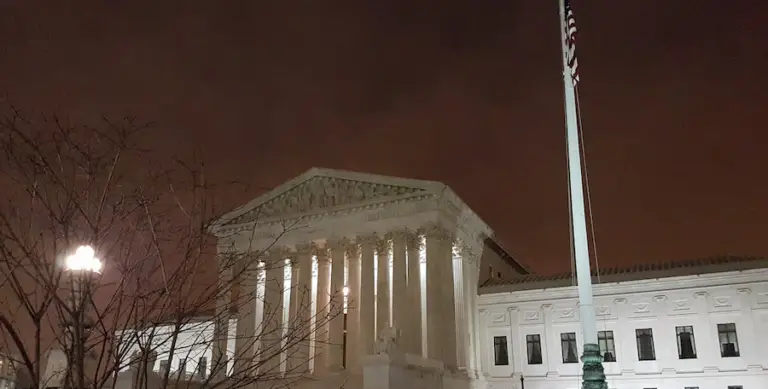Federal Judge Rules Against New Wire Act Gambling Opinion

Online gambling operators and multi-state lotteries scored an important court victory today after a federal judge ruled against the Department of Justice over its controversial 2018 decision to reinterpret the scope of the Federal Wire Act.
The decision was issued today to conclude a lawsuit brought against the Department of Justice by the New Hampshire Lottery Commission (NHLC). The NHLC filed the lawsuit earlier this year in response to an opinion delivered by the DOJ in the final days of 2018 that it now interprets the Wire Act as applying to all forms of online gambling, not just sports betting.
Today’s ruling reverts the DOJ’s interpretation of the Wire Act back to its 2011 opinion, which is that the Wire Act applies only to sports betting. It was the 2011 opinion that allowed states to take their lotteries online and pass legislation legalizing online casinos and poker sites in the first place.
With today’s ruling, the New Hampshire Lottery may continue operations as normal without worries that a DOJ crackdown could be coming any day now. It ends months’ worth of uncertainty for New Hampshire, multi-state lotteries and online gambling operators around the country – at least for now. The DOJ may still appeal the ruling to potentially take this case all the way to the Supreme Court.
New Hampshire Governor Chris Sununu praised the decision today with a brief statement:
“Today’s ruling is a historic victory for the state of New Hampshire and we are proud to have led this effort. New Hampshire stood up, took action and won – all to protect public education in our state.”
A Brief Background of the Wire Act and Flip-Flopping DOJ Opinions
The Federal Wire Act was originally passed in 1961 in an effort to crack down on organized crime groups that were entrenched in illegal sports betting at the time. Criminal groups involved in sports betting relied heavily on telephones and telegrams to conduct business across state lines, and thus the Wire Act was born.
The basic gist of the Wire Act is that it criminalized the use of “wire communications” to transmit information related to sports betting across state lines. The passage of the Wire Act gave US authorities a powerful new tool to use in the fight against organized crime members who tended to run multi-state sports betting operations.
The crafters of the Wire Act obviously had no idea the internet would ever be a thing, but the act was later interpreted to apply to online gambling since that too relies on “wire communications.” This interpretation made it possible for law enforcement agencies to target the many offshore gambling sites that popped up in the mid-90s and later offering their services to Americans contrary to US law.
The official DOJ position during those years was that the Wire Act applies to all forms of online gambling. Under that interpretation, individual states were prevented from authorizing online lotteries, casino games and poker.
In 2009, the directors of the NY and IL lotteries started the wheels of change when they asked the DOJ for its opinion on their plans to sell lottery tickets online. Both lotteries were keen to take advantage of online sales but were unsure if doing so would violate the Federal Wire Act.
The DOJ finally responded in 2011 with an opinion that would have wide-ranging impacts: moving forward, it would interpret the Wire Act as applying only to sports betting and not to other forms of online gambling. This opened the door not just to online lotteries, but also to online casinos and poker games.
Between 2011 and 2018, multiple states legalized online casino games, poker, and lotteries. Sports betting was never exempted from the Federal Wire Act at any point, but states have generally avoided Wire Act implications by ensuring all wagering activity takes place within state lines. There are still some questions regarding how the Wire Act could impact legal sports betting in the future, but that’s a subject for another day.
Things were good for states with legal online gambling until the DOJ suddenly issued its new opinion at the end of 2018. The opinion didn’t just reinstate the pre-2011 Wire Act interpretation, it actually expanded the scope of the Wire Act to potentially put multi-state lottery games such as Powerball and Mega Millions at risk since those too rely on interstate communications to operate.
This prompted the NHLC to file a lawsuit against the DOJ in February to protect the millions of dollars’ worth of revenue the lottery generates for the state. The lawsuit claimed the 2018 DOJ opinion is arbitrary, creates uncertainty and “intrudes upon the sovereign interests of the State of New Hampshire without unmistakably clear language demonstrating that Congress intended such a result.”
Today’s decision reverts the Department of Justice opinion back to its 2011 interpretation: that the Wire Act only applies to sports betting. This is a big win for New Hampshire, but the battle may not be over yet. If the DOJ appeals, we’ll be looking at more court cases and potentially more uncertainty. Even so, today’s court win was a key victory for New Jersey and online gambling in general across the country.







